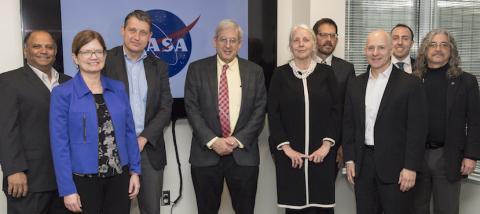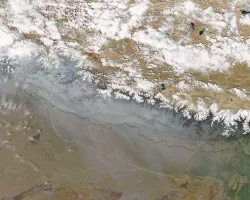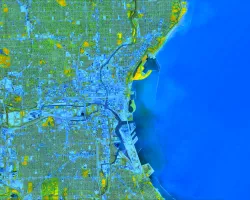Continuous streams of Earth observations and information made possible by NASA form the foundation for critical environmental planning and decisions by people all over the world. But many organizations and governments are resource challenged and lack the capacity to put these timely insights to work.
A new partnership between NASA and the University of Twente -- a public research university located in Enschede, Netherlands -- aims to bridge some of those gaps. Scientific collaboration between the agency’s SERVIR program and the University’s Faculty of Geo-Information Science and Earth Observation (ITC) will help more people in developing countries harness the power of Earth observations and geospatial technologies to solve problems, improve lives and prepare for the future.

Leaders from both groups met April 17-18 at NASA Headquarters in Washington, to kick off the 10-year cooperative agreement.
"NASA is passionate about connecting with world-class partners that are already creating positive change,” said Dan Irwin, SERVIR Global Program Manager at NASA's Marshall Space Flight Center in Huntsville, Alabama. "Through its renowned collaborative educational and research activities, ITC is doing just that -- helping vulnerable communities build resilience and thrive in our changing planet."
SERVIR is already working with more than 45 countries to strengthen awareness of the unique benefits of Earth observations and to increase their use and impact through its network of four regional hubs in Eastern and Southern Africa, West Africa, the Hindu Kush Himalaya region, and the Lower Mekong region of Southeast Asia.
ITC is recognized worldwide for achievements in teaching, research and capacity development in the field of geo-information science and earth observation. ITC educates its students to be professionals capable of acquiring knowledge and translating this into practical applications for solving real-world problems.
"We really look forward to working together on institutional strengthening and regional capacity building with the SERVIR hubs, most of which have already had a long history of collaboration with ITC," said Dr. Freek van der Meer, vice chairman of the university's Department of Earth System Analysis. "Together we will focus on the ‘last mile’ to embed Earth observation firmly in society and to help protect communities in developing countries."
Under the agreement, ITC and SERVIR team members will work hand-in-hand with local teams to develop training, enhance service delivery and conduct research relevant to the needs of communities in SERVIR hub regions. The partnership will also create unique and innovative opportunities for enriched and continuing education for ITC students and SERVIR scientists.
"This is a phenomenal partnership," said Irwin. "Together, we'll leverage each other's strengths and do more to help ensure that scientific knowledge is applied and creates even greater societal benefits."
Building and relying upon a growing network of partners is foundational to the SERVIR program. SERVIR, which means "to serve" in Spanish, is a joint development initiative of NASA and the U.S. Agency for International Development (USAID) in Washington. SERVIR works in partnership with leading regional organizations worldwide, creating tools, products and services that empower decision makers to better address critical issues related to food security, water resources, natural disasters, land use, and weather variability.
SERVIR's four hubs include the Regional Centre for Mapping of Resources for Development in Nairobi, Kenya; the International Centre for Integrated Mountain Development in Kathmandu, Nepal; the Asian Disaster Preparedness Center in Bangkok, Thailand; and the Agrometeorology, Hydrology and Meteorology Regional Center in Niamey, Niger.


